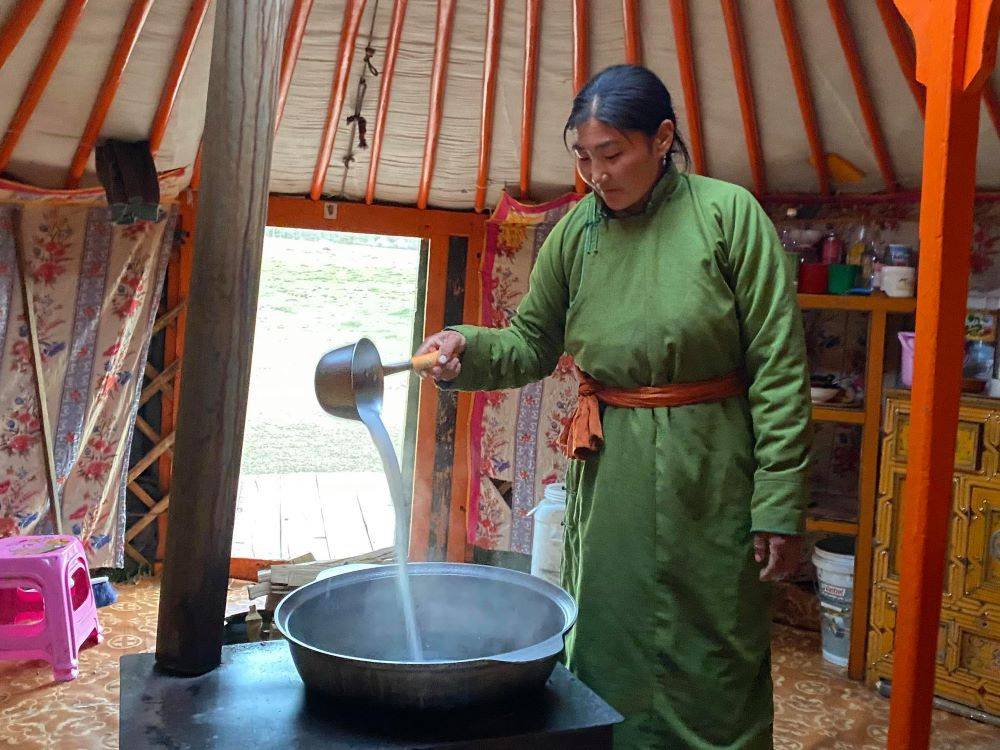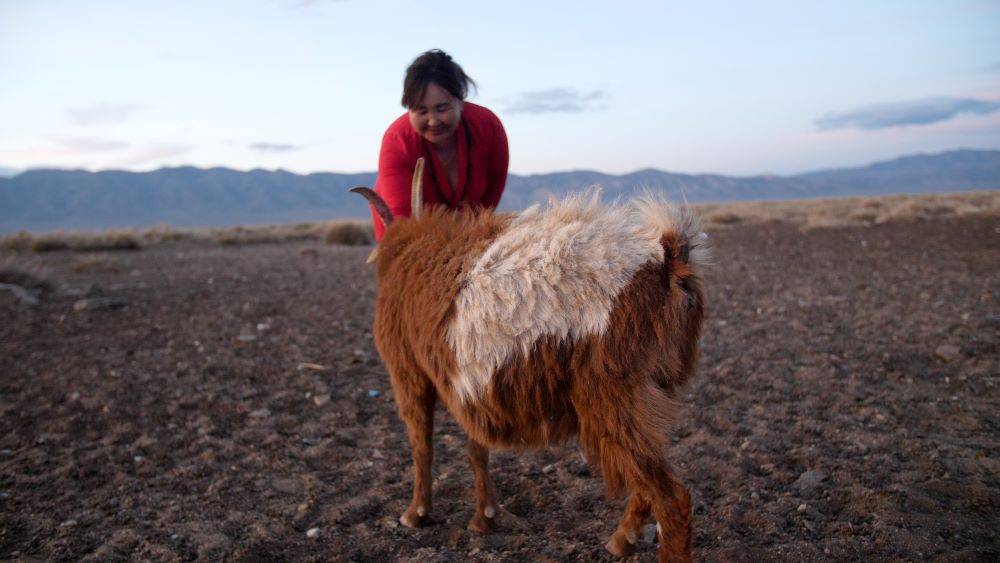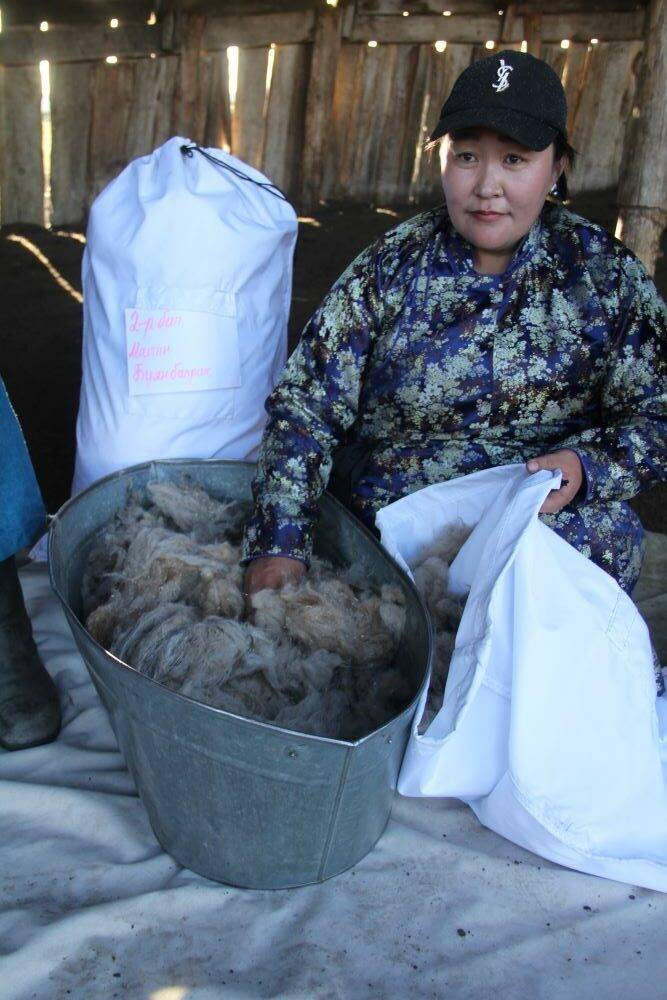Over the course of 2022, the Sustainable Fibre Alliance (SFA)1 carried out comprehensive research, designed to explore the realities of decent work and women’s empowerment within cashmere herding communities in Mongolia. The research, which formed the baseline for ensuring the support and inclusion of decent work and gender themes within the SFA’s work, explored a range of topics with women from the Arkhangai and Bayankhongor provinces and looked to define decent work in conjunction with several core factors. These included the health and wellbeing of their families, livestock and their environment – also known as the nutag2. They discussed external factors such as the growing threat of climate change and the increasing frequency of extreme weather patterns, alongside societal and structural barriers to education, training, self-care, child labour, culture loss, collective representation and social isolation due to the triple labour burden3. Naturally, it’s important to note that one organisation alone can’t address the entirety of these obstacles and there are a number of contributing factors that impact and mould women’s access to decent work that are outside the influence of such agencies as the SFA. Instead, it takes a holistic, comprehensive approach from many different inputs that are inclusive but not limited to international and national governments and organisations, culture, and the fluidity and expectations of gender roles and their recognition within the family and community units they exist in.

The SFA’s Cashmere Standard, which defines best practices for responsible cashmere production in line with the ILO’s Conventions, operates on Voluntary Sustainability Systems4 which, in the context of the UN’s Global Goals, have the opportunity to deliver gender-inclusive, decent work opportunities for women, especially within the context of rural pastoralists. Both male and female Mongolian herders see herding as a meaningful way of life, not just a profession, with meaningful work going hand-in-hand with their view of decent work. Meaningful work, defined by the herders as having pride and a sense of identity when it came to their labour, culture, knowledge and produce, gave them a feeling of value and respect within their communities. The promotion of decent work is one of five Global Principles that form the SFA’s Cashmere Standard. The Standard’s focus on decent work is specific to implementing: fair hiring practices, fair working conditions, the protection of traditional communities, the prevention of child labour and the promotion of health and safety. In practice, cooperatives and/or herders that are accredited by the SFA must adhere to these guidelines to obtain and maintain SFA certification. Human rights and gender equality play a significant role throughout the Standard’s criteria, ensuring not only fair treatment and active roles in decision-making for women in SFA cooperatives but also equal pay – equal pay for equal work. In January 2023, a revised version of the SFA’s Cashmere Standard was published to include the SFA’s three herder-level codes of practice; the Rangeland Stewardship and Animal Husbandry Codes of Practice and the SFA x ICCAW Cashmere Goat Welfare Code of Practice. Since then, the Standard has gone through a further period of consultation and revision to create the Cashmere Standard V2.0 . This took place during 2024. Throughout the consultation period, the SFA has worked in collaboration with external consultant Tristam Barrett to examine areas for development in the revised Cashmere Standard with respect to mainstreaming gender, in line with but not exclusive to the recommendations from the women herders’ discussions with Professor María E. Fernández-Giménez and her team. These findings have shaped Version 2.0 and the criteria in which they address gender inclusion within the application of the Cashmere Standard within herder communities.

In conjunction with their personal relationships with decent work, the women who took part in the research observed the significant issue with children, especially boys, being removed from school too early to support the herd. They addressed the pressures of ensuring their children gained access to an education, while highlighting that if mothers were unable to leave their children at soum centres5, they would have to home-school them, further adding to their workload. Addressing children’s premature removal from school, the SFA’s Cashmere Standard v2.0 states:
- The entity (herders and/or herder cooperatives) and its sites shall ensure that school-age children learning to herd livestock only do so outside of school hours.
As well as noting that children are required to stay in school throughout schooling years, the SFA’s Cashmere Standard naturally takes a hard line on child labour of any kind stating that ‘children should not be involved in any hazardous labour or engage in the worst forms of child labour’ as defined by the ILO Convention 182 and Recommendation 190. Due to the conjoined nature of family and work life for herder families, extra pressures within the family unit directly impact situations for mothers who have to juggle the health and well-being of their family while ensuring the health, quality and productivity of their livestock and produce. Furthermore, the expectation on women to come forward as decision-makers within their communities, while having to deal with the pressures of the triple labour burden, may also present extra pressure in the name of ‘gender progression’. Understanding the nuances of what women gain from their work both at home and outside is paramount to the development of women’s roles within wider cashmere herding communities.
During the research, there were discussions regarding the impact of increased rural-to-urban migration – a country-wide shift seeing more and more young people migrating to the capital Ulaanbaatar in search of work and a more modern way of life6. The women made recommendations to ensure such a movement of people didn’t lead to culture loss, stressing the importance of promoting the benefits of herder culture and life in the countryside. They highlighted how increasing training opportunities for young herders, the development of urban-rural exchange programs, networking, and the development of work experience opportunities for urban youth could all raise awareness about their heritage and herder culture, while showcasing the positive attributes of life as a Mongolian herder. While there is no one way to address these concerns in their entirety, the SFA takes informed approaches to carry out changes with short-, medium- and long-term work programmes. Through herder-based incentives and work programmes to support best practices, the SFA recognises herders’ sustainability, fibre quality and animal welfare contributions, while celebrating best practices with nationally recognised awards. The SFA’s work programmes, funded by SFA members, focus on more targeted training opportunities for herders and herding communities across young herders, women empowerment, animal welfare, water stewardship, and breeding and fibre quality. The programmes allow the SFA’s brand members to contribute towards training that may address some of the issues raised by the women herders. For example, by funding training for young herders, might this bridge the gap for young people who might not have decided on their futures in herding? Or could fully funded, competency-based training help women to gain access to better economic opportunities?
A statement from the SFA’s Mongolian Country Coordinator, Vandandorj Sumiya:
“There are three different competency-based training programs and training materials developed: greasy cashmere sorting, animal health protection and animal breeding. Different trainings are organised at different seasons due to the nature of animal husbandry activities. For instance, greasy cashmere sorting training takes place in spring as it’s the main season for cashmere combing. Animal health protection training is conducted during summer, during which most herders do annual vaccinations for animals and use vet services, and animal breeding training is organised in autumn, just before breeding season starts.”

Sumiya goes on to explain that, “The training has been happening since 2021 and at this moment over 1,800 herders have attended the training, and of which 1,100 are female herders. The competency-based training courses have two sections, one in a classroom that focuses on providing information or theoretical knowledge that takes one day. The second part is in practice, during which herders practise what they have learnt about animal husbandry and provide proof or documentation of their practice to the trainers. Once herders attend all three courses, they will be awarded a “Herder” occupational certificate from the Ministry of Labor and Social Protection.”
You can learn more about the SFA’s various work and incentive programmes here.
External factors such as climate change and the growing frequency and intensity of dzuds were overarching themes throughout the research. When discussing the damaging impact of dzuds on their communities and their livestock, the women recommended long-term weather forecasts and pre-warnings to signal appropriate preparations and the stockpiling of hay and other food items for animals. However, while some communities can gain access to preparatory items for such extreme winters, there are a number of other obstacles such as rising food and fuel prices that impact herders’ preparations ahead of difficult periods, especially in areas where the land is less productive. In collaboration with the SFA, Alina Haus from the University of Göttingen produced a study that took a closer look at these particular issues, focusing on winter preparation and feeding management of certified herder cooperatives – read a summary here. In February 2024, Mongolia was hit by a devastating dzud that affected 80% of the country, killing over 11% of livestock as of May 2024. To create a clearer understanding of the devastating impact of dzuds, the SFA have produced several articles better explaining both the personal and commercial cost of these weather patterns, their support and aid response and their plans for similar, catastrophic events in the future.

Women’s access to decent work in the context of SFA-certified cooperatives is underscored by a multitude of factors. The combined pressures of the triple labour burden, mass migration and climate change all factor in, adding further pressure to an already fragile ecosystem. The practical measures taken by the SFA including a more gender-responsive Cashmere Standard and incentives and training opportunities, all work towards creating a holistic framework that addresses some of the issues raised by the women who took part in the research. However, nuance is key and because of such uncertainty with respect to changes in climate, the environment and cultural shifts, women have a vital yet sensitive role in shaping the future of herding in modern Mongolia.
The SFA is developing its Women and Decent Work Strategy in the run-up to 2030 and 2040, and we encourage anyone to reach out to get involved.
Lotti Blades-Barrett
21 November 2024
